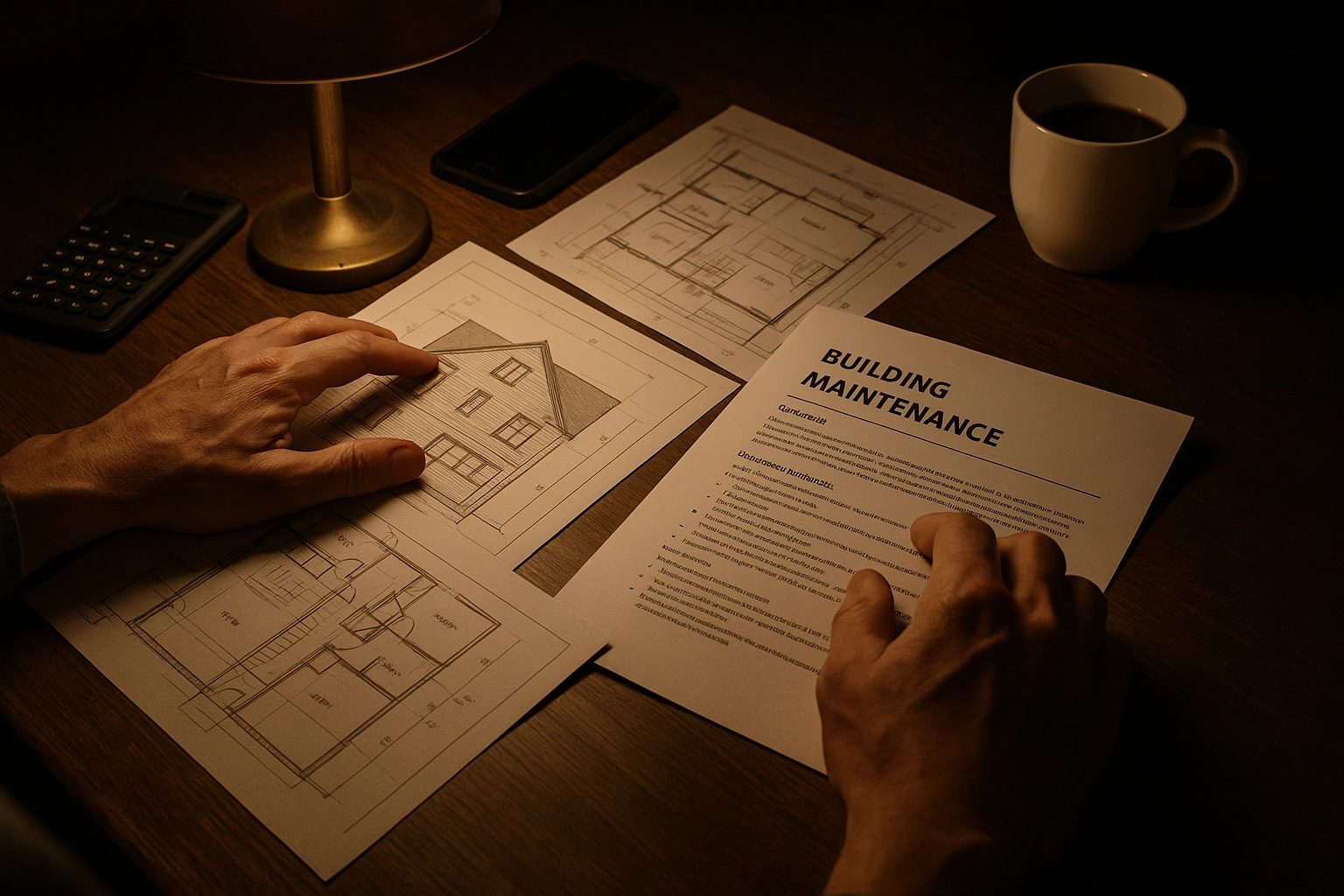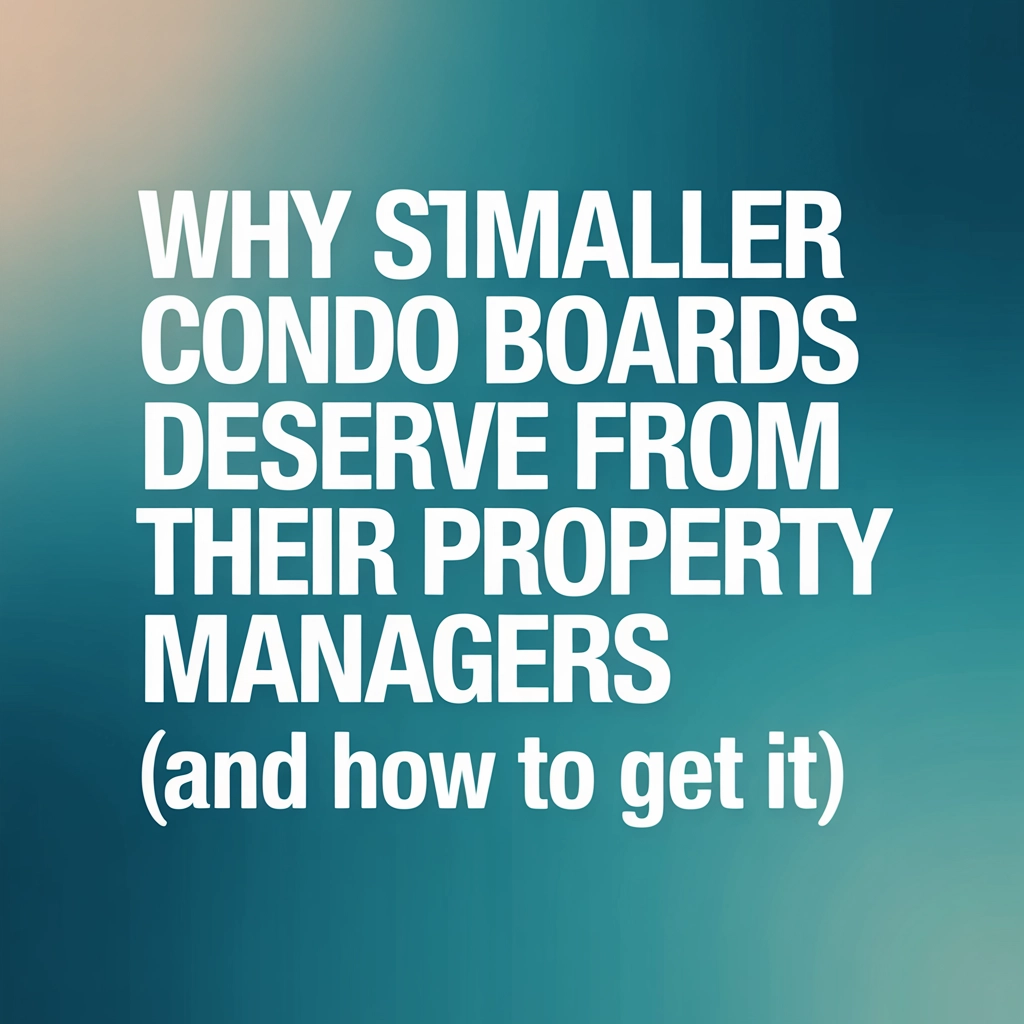If you're serving on a smaller condo board in Toronto, you've probably felt it: the frustration of juggling the same complex responsibilities as massive downtown towers, but with a fraction of the resources. You're dealing with budget constraints, limited volunteer time, and vendors who seem more interested in the big-ticket clients. Meanwhile, you're expected to maintain the same standards, follow identical regulations, and keep residents happy: all while managing maybe 12, 20, or 50 units instead of 200.
Here's the truth that needs to be said: smaller condo boards deserve more from their property managers, not less. And if you're not getting that enhanced service, it's time to demand it.
The Small Building Struggle Is Real
Running a small condo corporation in Toronto isn't just a scaled-down version of managing a large building: it's often more challenging per unit. You're dealing with the same Ontario Condo Act requirements, the same need for reserve fund studies, and the same complex mechanical systems that require professional oversight.

But here's where it gets unfair: a three-person board handling 15 units faces virtually identical administrative burdens as a seven-person board managing 150 units. Both need annual budgets, both require compliance with provincial legislation, and both deal with maintenance emergencies that don't care about building size.
The math simply doesn't work in your favor. When major repairs hit: think elevator maintenance, roof work, or HVAC upgrades: smaller buildings can't spread these costs across hundreds of units. A $50,000 repair that might add $250 to each unit's special assessment in a 200-unit building suddenly becomes a $3,300 hit per unit in a 15-unit building.
Why Small Boards Get Shortchanged
Most property management companies operate on volume models. They make money by managing many units efficiently, which often means standardized service packages designed for larger buildings. The result? Smaller boards get cookie-cutter solutions that don't address their unique challenges.
Consider vendor relationships. Large buildings have negotiating power: contractors want their business and will compete for it. Small buildings? You're often paying retail prices because vendors know you don't have alternatives or leverage.
The volunteer burnout is real too. Board members in smaller buildings often wear multiple hats, handling everything from architectural reviews to emergency decisions. Unlike larger buildings that can afford professional staff or larger boards with specialized committees, small building boards are stretched thin.

What Smaller Boards Actually Deserve
If you're managing a smaller Toronto condo, you deserve property management services that acknowledge and compensate for these inherent disadvantages. Here's what that looks like:
Enhanced Communication and Availability
Your property manager should be more accessible, not less. Since you can't afford dedicated on-site staff, your PM needs to be your eyes and ears. This means more frequent check-ins, faster response times to urgent issues, and clearer communication with residents who might otherwise overwhelm board members with direct complaints.
Creative Cost-Saving Solutions
A good property manager working with smaller buildings should be actively hunting for cost efficiencies. This might mean bundling services with other small buildings they manage, finding specialized contractors who work well with smaller projects, or identifying preventive maintenance opportunities that save money long-term.
More Intensive Project Oversight
When your building undertakes a major project, you deserve hands-on management. Unlike large buildings with dedicated property committees, your three-person board can't oversee contractors daily. Your property manager should fill this gap with detailed project management, regular updates, and quality control that ensures you get full value from limited dollars.

Specialized Financial Guidance
Small buildings need more sophisticated financial planning, not less. Your property manager should provide detailed budget analysis, creative reserve fund strategies, and transparent reporting that helps your board make informed decisions within tight financial constraints.
How to Demand Better Service
Ready to upgrade your property management experience? Here's your action plan:
1. Audit Your Current Service Level
Start by honestly assessing what you're getting versus what you're paying for. Are you receiving standardized monthly reports that could apply to any building, or customized insights that address your specific challenges? Does your property manager proactively suggest cost-saving measures, or do they simply execute your requests?
2. Negotiate Service Expectations Upfront
When evaluating property management companies, don't accept one-size-fits-all proposals. Specifically outline your needs as a smaller building and ask how their service model accommodates these challenges. Request customized service packages that acknowledge the extra attention smaller buildings require.
3. Leverage Professional Networks
Your property manager's industry connections should benefit you directly. They should be able to secure better vendor pricing through their relationships, recommend contractors experienced with smaller projects, and share cost-saving strategies they've developed with similar buildings.

4. Insist on Transparent Communication
Demand regular, detailed updates that go beyond standard monthly reports. You need to understand not just what happened, but why decisions were made and how they impact your bottom line. This includes early warning about potential issues and proactive recommendations for addressing them.
5. Require Proactive Maintenance Planning
Your property manager should develop preventive maintenance strategies specifically tailored to your building's age, systems, and budget constraints. This means prioritizing repairs that prevent bigger problems later and scheduling maintenance to minimize emergency call-out fees.
The Toronto Advantage
Toronto's competitive property management market actually works in your favor if you know how to leverage it. The city has numerous firms specializing in smaller buildings, and many have developed innovative service models specifically designed for buildings under 100 units.

Don't settle for being the afterthought client. Toronto's smaller condo buildings deserve property managers who understand that providing excellent service to a 20-unit building might require more creativity and attention than managing a 200-unit tower: and price their services accordingly.
Making the Change
If your current property manager isn't delivering the enhanced service your small building deserves, it might be time for a change. Start by clearly documenting the gaps in service you're experiencing. Present these concerns to your current manager with specific expectations for improvement.
If they can't adapt their service model to better serve your needs, begin evaluating other options. Look for property management companies that specifically highlight their experience with smaller buildings and can provide references from similar-sized Toronto condos.
Remember: You're not asking for charity: you're demanding appropriate service levels that acknowledge the unique challenges small buildings face. A property manager who understands this distinction and tailors their services accordingly isn't just doing you a favor: they're doing their job properly.
Your small condo building has the same right to professional, responsive, and creative property management as any downtown tower. The only difference should be the solutions are tailored to your scale, not watered down because of it.

